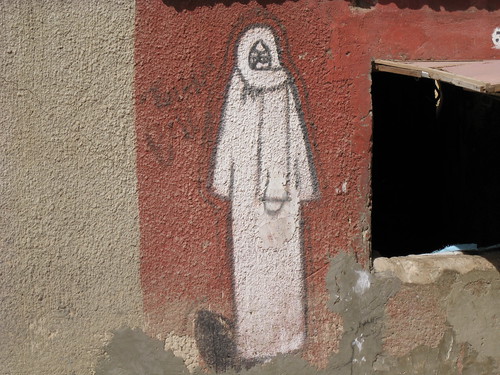
All that art is based on one surviving photo:

This is Cheikh or "Sheik" Ahmadou Bamba Mbacké (1853-1927) God's "protégé", poet, mystic and founder of a religious order.
Senegal follows a brand of Islam called Sufism. It is different than the Sunni version we hear about in the Middle East in that it is mystical, focusing on the believer's experience with God, and is less concerned about following "Da Rulz". That's why things like alcohol, cannibis, depictions of the human face in art, conversion to Christianity and other religions, women uncovered or even bearing skin, etc. are met with a shrug rather than outrage (though you don't want to rub these things in anyone's face.)
Cheikh Ahmadou Bamba was a mystic and religious leader who produced a prodigious quantity of poems and tracts on meditation, rituals, work, and Qur'anic study. Politically, Ahmadou Bamba led a pacifist struggle against French colonialism while not waging outright war on the French.
Bamba is called God's protégé" in French on the graffiti here. I think it would be offensive to translate that as a prophet because only Muhammad is God's prophet, but calling him a saint might work. "Renewer" may be another word. He attempted to study in the Qur'anic schools of the Middle East but dropped out, came back to Sénégal and founded an order which emphasizes salvation through hard work. His most famous phrase is: "Pray as if you will die tomorrow and work as if you will live forever."
The rest comes from Wikipedia:
As his fame spread, the French colonial government worried about Bamba's growing power and potential to wage war against them. He had converted a number of traditional kings and their followers and no doubt could have raised a huge military force, as Muslim leaders like Umar Tall and Samory Touré had before him.
The French sentenced him to exile in Gabon (1895–1902) and later in Mauritania (1903–1907). However, these exiles fired stories of Bamba's miraculous survival of torture, deprivation, and attempted executions, and thousands more flocked to his organization. On the ship to Gabon, forbidden from praying, Bamba is said to have broken his leg-irons, leapt overboard into the ocean and prayed on a prayer rug that appeared on the surface of the water, so devout was he. Or, when the French put him in a furnace, he simply sat down in it and drank tea with Muhammad. In a den of hungry lions, the lions slept beside him, etc.
By 1910, the French realized that Bamba was not interested in waging war against them, and was in fact quite cooperative, eventually releasing him to return to his expanded community. In 1918, he won the French Legion of Honor for enlisting his followers in the First World War and the French allowed him to establish his community in Touba, believing in part that his doctrine of hard work could be made to serve French economic interests. His movement was allowed to grow, and in 1926 he began work for the great mosque at Touba where he is buried.
...Amadou Bamba's teachings emphasized the virtues of pacifism and the importance of hard work, became in the 20th century one of the biggest influences on contemporary Senegalese life and culture...
Evidently the Saudis find all this terribly unorthodox and are pouring the petrodollars we give them to fill our cars into "reviving" Islam in west Africa and bringing it closer to the stricter Sunni Wahabiism practised in the Middle East.



Aucun commentaire:
Publier un commentaire